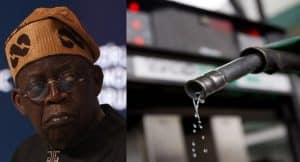I
Ikenna Ngere
Guest

Nigeria has witnessed a staggering decline in daily consumption of Premium Motor Spirit (PMS), commonly known as petrol, within just one year following President Bola Tinubu‘s assumption of office on May 29, 2023.
According to data obtained by Channels Television from the Nigerian Midstream and Downstream Petroleum Regulatory Authority (NMDPRA), petrol consumption fell to 4.5 million litres per day by August 20, 2024.
This marks a drastic decrease from the 60 million litres consumed daily as of May 2023, representing a 92% drop since Tinubu took office.
An analysis of the report revealed that only 16 out of Nigeria’s 36 states received petrol allocations from the Nigerian National Petroleum Company Limited (NNPCL) during August, leading to fuel scarcity in the remaining states.
In terms of distribution, Niger State received the highest allocation with 21 trucks, equating to 940,000 litres per day.
Lagos followed with 12 trucks, amounting to 726,001 litres, and Kaduna also received 12 trucks, providing 454,001 litres.
Other states like Oyo and Kano received 12 and 9 trucks, respectively, while Ondo, Kwara, and Edo received lower allocations.
President Tinubu’s administration ended petrol subsidies on May 29, 2023, which had reportedly cost the government around ₦12 trillion over the past decade.
The President stated that the subsidies were unsustainable and had led to significant national debt.
Since the subsidy removal, petrol prices have skyrocketed from ₦195 per litre to approximately ₦1,300 per litre, contributing to a surge in headline inflation that reached an almost three-decade high of 34.19% in June.
Although inflation has slightly slowed to 32.7% by September, the cost of living has continued to rise, plunging an estimated 129 million Nigerians into poverty, as reported by the World Bank.
The latest World Bank data shows a significant increase in the poverty rate, which has escalated from 40.1% in 2018 to 56% in 2024.
The World Bank report partly read, “With growth proving too slow to outpace inflation, poverty has risen sharply. Since 2018, the share of Nigerians living below the national poverty line16 is estimated to have risen sharply from 40.1 per cent to 56.0 per cent.
“Combined with population growth, this means that some 129 million Nigerians are living in poverty. This stark increase partly reflects Nigeria’s beleaguered growth record. Real GDP per capita has not recovered to the level it was at prior to the oil price-induced recession in 2016.”
It further highlights that the ongoing economic challenges have deepened the poverty crisis, with over 115 million Nigerians estimated to have been living in poverty in 2023.
“Multiple shocks in a context of high economic insecurity have deepened and broadened poverty, with over 115 million Nigerians estimated to have been poor in 2023. Since 2018/19, an additional nearly 35 million people have fallen into poverty, so that more than half of Nigerians (51.1 per cent of the population in 2023) are now estimated to live in poverty,” it added.
The post Hardship: Daily Petrol Consumption Plummets By 92% Under Tinubu — Report appeared first on Naija News.
